Sochi Doping Scandal: Course Essay on Olympic Changing Moment
VerifiedAdded on 2023/05/30
|7
|1627
|266
Essay
AI Summary
This essay delves into the Sochi Doping Scandal, examining the systematic doping program within Russian sports, which began in November 2014. It investigates the triggering factors, including evidence of state-sponsored cheating revealed by the World Anti-Doping Agency (WADA) and the subsequent McLaren Report. The essay explores the International Olympic Committee's (IOC) handling of the scandal, the political weight of Russia in the Olympics, and the impact on Russian athletes. It analyzes the motivations behind the doping program, the role of the Russian anti-doping lab, and the findings of the Schmid Commission. Furthermore, it addresses the consequences for Russia's international image, political ties, and the future of its athletes. The essay utilizes credible sources and provides a comprehensive overview of this Olympic changing moment, highlighting the widespread manipulation and cover-ups within the Russian sports system and its far-reaching implications. The essay also examines the role of Grigory Rodchenkov, the Russian whistleblower, and the impact on the 2018 World Cup preparations.
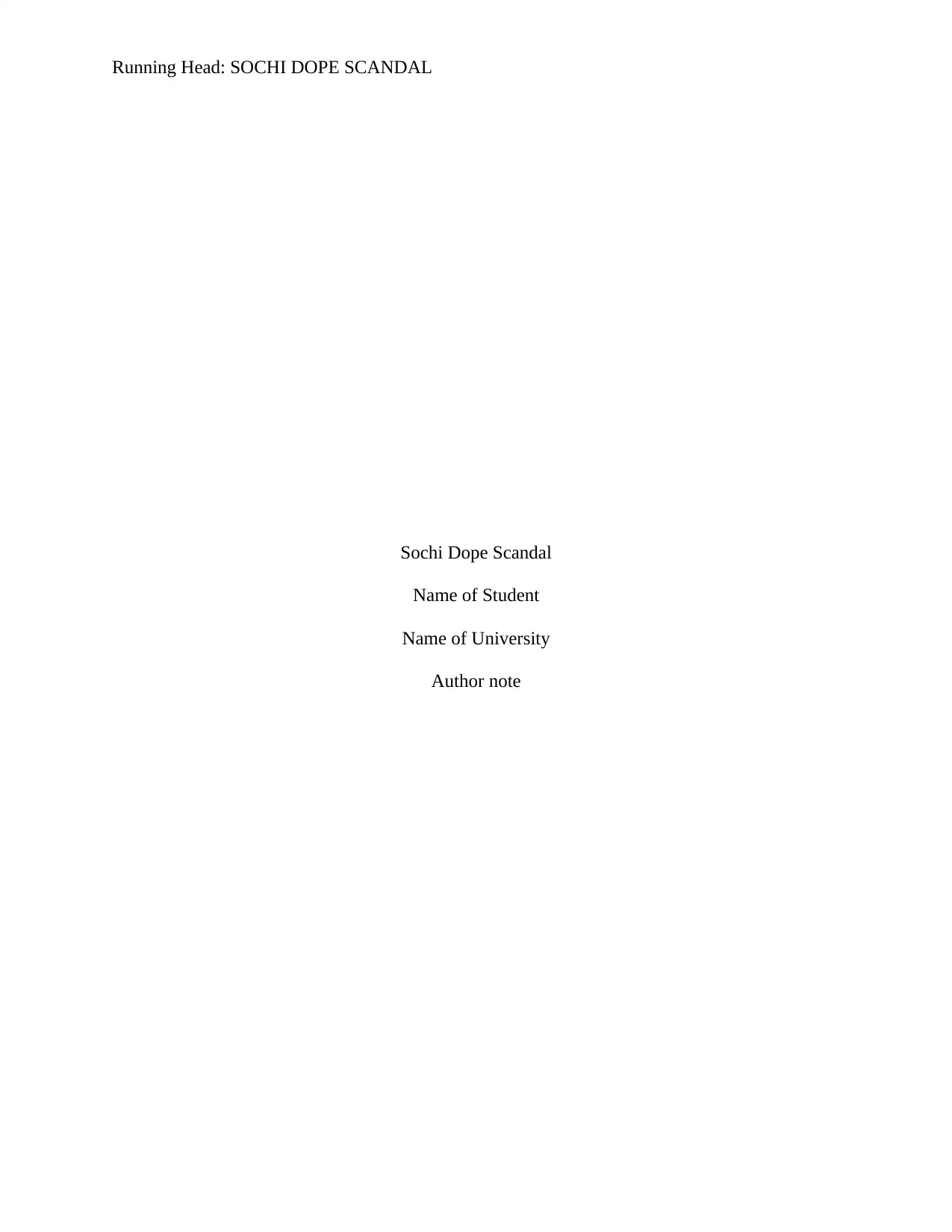
Running Head: SOCHI DOPE SCANDAL
Sochi Dope Scandal
Name of Student
Name of University
Author note
Sochi Dope Scandal
Name of Student
Name of University
Author note
Paraphrase This Document
Need a fresh take? Get an instant paraphrase of this document with our AI Paraphraser
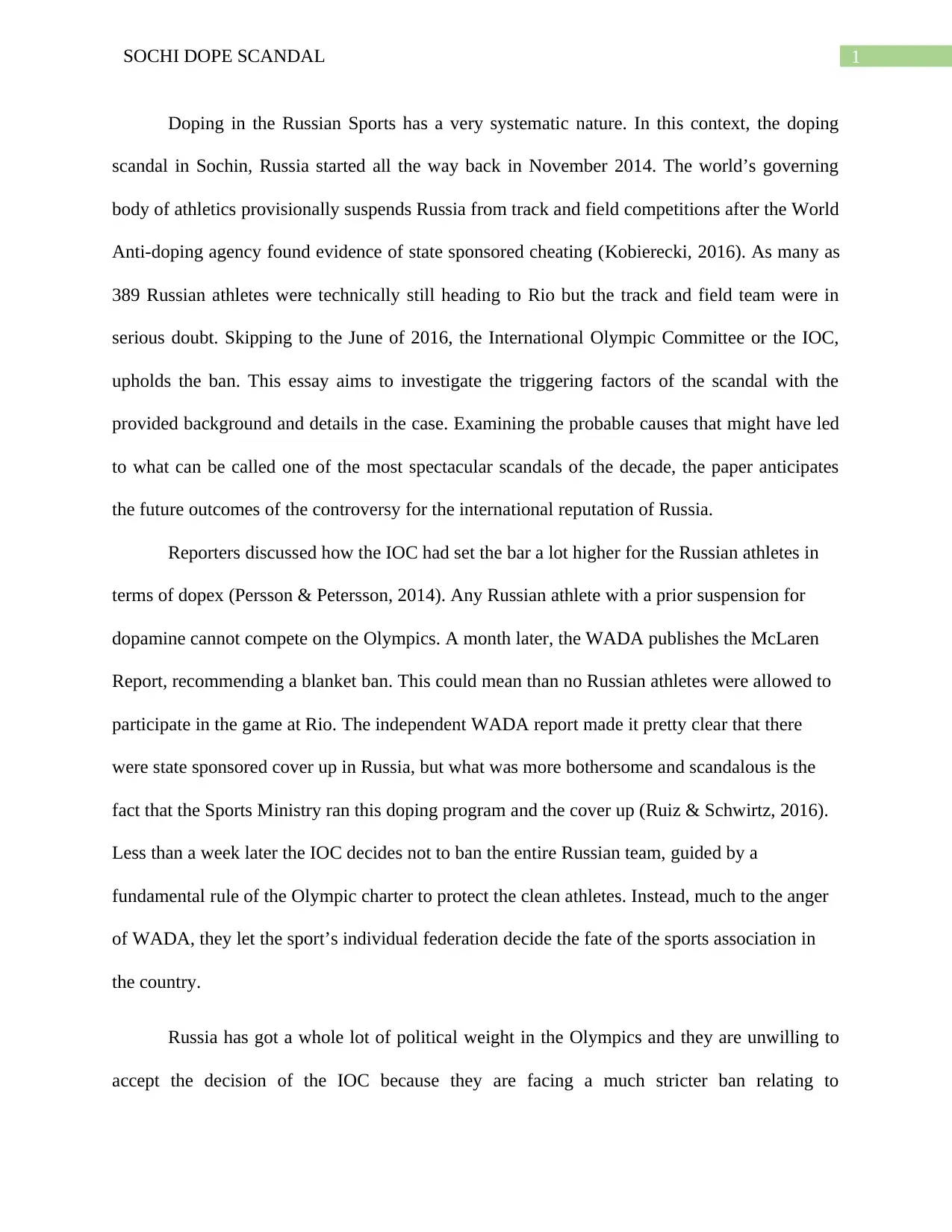
1SOCHI DOPE SCANDAL
Doping in the Russian Sports has a very systematic nature. In this context, the doping
scandal in Sochin, Russia started all the way back in November 2014. The world’s governing
body of athletics provisionally suspends Russia from track and field competitions after the World
Anti-doping agency found evidence of state sponsored cheating (Kobierecki, 2016). As many as
389 Russian athletes were technically still heading to Rio but the track and field team were in
serious doubt. Skipping to the June of 2016, the International Olympic Committee or the IOC,
upholds the ban. This essay aims to investigate the triggering factors of the scandal with the
provided background and details in the case. Examining the probable causes that might have led
to what can be called one of the most spectacular scandals of the decade, the paper anticipates
the future outcomes of the controversy for the international reputation of Russia.
Reporters discussed how the IOC had set the bar a lot higher for the Russian athletes in
terms of dopex (Persson & Petersson, 2014). Any Russian athlete with a prior suspension for
dopamine cannot compete on the Olympics. A month later, the WADA publishes the McLaren
Report, recommending a blanket ban. This could mean than no Russian athletes were allowed to
participate in the game at Rio. The independent WADA report made it pretty clear that there
were state sponsored cover up in Russia, but what was more bothersome and scandalous is the
fact that the Sports Ministry ran this doping program and the cover up (Ruiz & Schwirtz, 2016).
Less than a week later the IOC decides not to ban the entire Russian team, guided by a
fundamental rule of the Olympic charter to protect the clean athletes. Instead, much to the anger
of WADA, they let the sport’s individual federation decide the fate of the sports association in
the country.
Russia has got a whole lot of political weight in the Olympics and they are unwilling to
accept the decision of the IOC because they are facing a much stricter ban relating to
Doping in the Russian Sports has a very systematic nature. In this context, the doping
scandal in Sochin, Russia started all the way back in November 2014. The world’s governing
body of athletics provisionally suspends Russia from track and field competitions after the World
Anti-doping agency found evidence of state sponsored cheating (Kobierecki, 2016). As many as
389 Russian athletes were technically still heading to Rio but the track and field team were in
serious doubt. Skipping to the June of 2016, the International Olympic Committee or the IOC,
upholds the ban. This essay aims to investigate the triggering factors of the scandal with the
provided background and details in the case. Examining the probable causes that might have led
to what can be called one of the most spectacular scandals of the decade, the paper anticipates
the future outcomes of the controversy for the international reputation of Russia.
Reporters discussed how the IOC had set the bar a lot higher for the Russian athletes in
terms of dopex (Persson & Petersson, 2014). Any Russian athlete with a prior suspension for
dopamine cannot compete on the Olympics. A month later, the WADA publishes the McLaren
Report, recommending a blanket ban. This could mean than no Russian athletes were allowed to
participate in the game at Rio. The independent WADA report made it pretty clear that there
were state sponsored cover up in Russia, but what was more bothersome and scandalous is the
fact that the Sports Ministry ran this doping program and the cover up (Ruiz & Schwirtz, 2016).
Less than a week later the IOC decides not to ban the entire Russian team, guided by a
fundamental rule of the Olympic charter to protect the clean athletes. Instead, much to the anger
of WADA, they let the sport’s individual federation decide the fate of the sports association in
the country.
Russia has got a whole lot of political weight in the Olympics and they are unwilling to
accept the decision of the IOC because they are facing a much stricter ban relating to
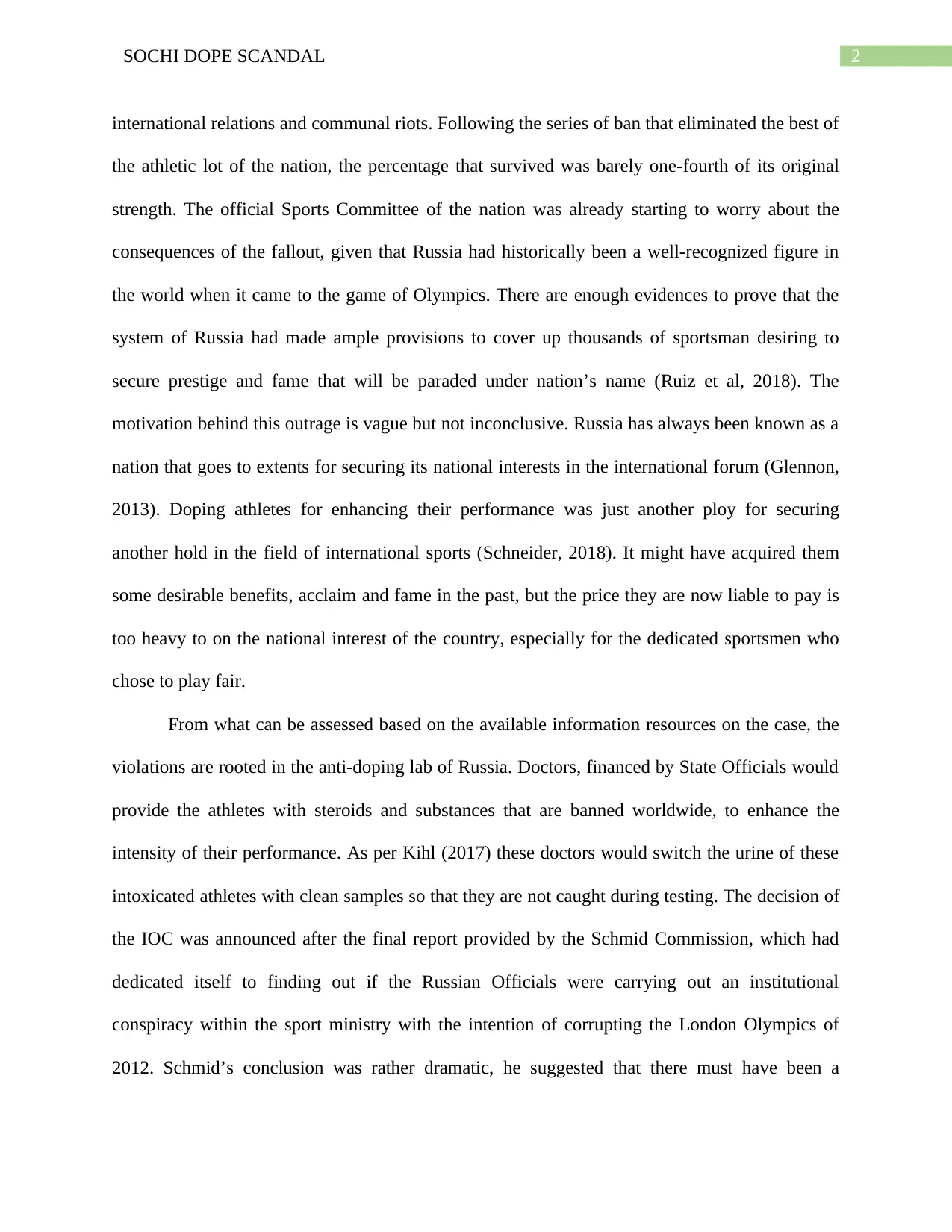
2SOCHI DOPE SCANDAL
international relations and communal riots. Following the series of ban that eliminated the best of
the athletic lot of the nation, the percentage that survived was barely one-fourth of its original
strength. The official Sports Committee of the nation was already starting to worry about the
consequences of the fallout, given that Russia had historically been a well-recognized figure in
the world when it came to the game of Olympics. There are enough evidences to prove that the
system of Russia had made ample provisions to cover up thousands of sportsman desiring to
secure prestige and fame that will be paraded under nation’s name (Ruiz et al, 2018). The
motivation behind this outrage is vague but not inconclusive. Russia has always been known as a
nation that goes to extents for securing its national interests in the international forum (Glennon,
2013). Doping athletes for enhancing their performance was just another ploy for securing
another hold in the field of international sports (Schneider, 2018). It might have acquired them
some desirable benefits, acclaim and fame in the past, but the price they are now liable to pay is
too heavy to on the national interest of the country, especially for the dedicated sportsmen who
chose to play fair.
From what can be assessed based on the available information resources on the case, the
violations are rooted in the anti-doping lab of Russia. Doctors, financed by State Officials would
provide the athletes with steroids and substances that are banned worldwide, to enhance the
intensity of their performance. As per Kihl (2017) these doctors would switch the urine of these
intoxicated athletes with clean samples so that they are not caught during testing. The decision of
the IOC was announced after the final report provided by the Schmid Commission, which had
dedicated itself to finding out if the Russian Officials were carrying out an institutional
conspiracy within the sport ministry with the intention of corrupting the London Olympics of
2012. Schmid’s conclusion was rather dramatic, he suggested that there must have been a
international relations and communal riots. Following the series of ban that eliminated the best of
the athletic lot of the nation, the percentage that survived was barely one-fourth of its original
strength. The official Sports Committee of the nation was already starting to worry about the
consequences of the fallout, given that Russia had historically been a well-recognized figure in
the world when it came to the game of Olympics. There are enough evidences to prove that the
system of Russia had made ample provisions to cover up thousands of sportsman desiring to
secure prestige and fame that will be paraded under nation’s name (Ruiz et al, 2018). The
motivation behind this outrage is vague but not inconclusive. Russia has always been known as a
nation that goes to extents for securing its national interests in the international forum (Glennon,
2013). Doping athletes for enhancing their performance was just another ploy for securing
another hold in the field of international sports (Schneider, 2018). It might have acquired them
some desirable benefits, acclaim and fame in the past, but the price they are now liable to pay is
too heavy to on the national interest of the country, especially for the dedicated sportsmen who
chose to play fair.
From what can be assessed based on the available information resources on the case, the
violations are rooted in the anti-doping lab of Russia. Doctors, financed by State Officials would
provide the athletes with steroids and substances that are banned worldwide, to enhance the
intensity of their performance. As per Kihl (2017) these doctors would switch the urine of these
intoxicated athletes with clean samples so that they are not caught during testing. The decision of
the IOC was announced after the final report provided by the Schmid Commission, which had
dedicated itself to finding out if the Russian Officials were carrying out an institutional
conspiracy within the sport ministry with the intention of corrupting the London Olympics of
2012. Schmid’s conclusion was rather dramatic, he suggested that there must have been a
⊘ This is a preview!⊘
Do you want full access?
Subscribe today to unlock all pages.

Trusted by 1+ million students worldwide
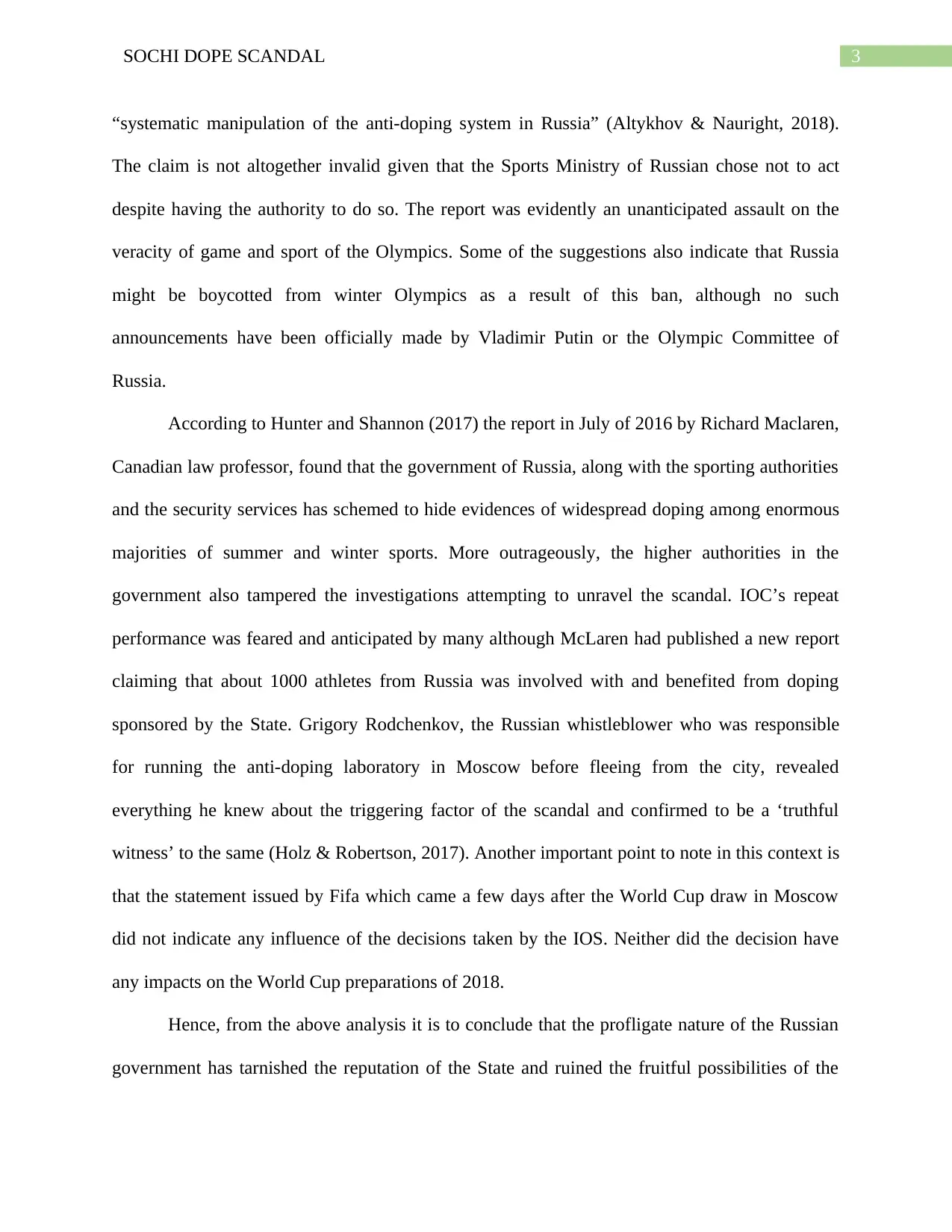
3SOCHI DOPE SCANDAL
“systematic manipulation of the anti-doping system in Russia” (Altykhov & Nauright, 2018).
The claim is not altogether invalid given that the Sports Ministry of Russian chose not to act
despite having the authority to do so. The report was evidently an unanticipated assault on the
veracity of game and sport of the Olympics. Some of the suggestions also indicate that Russia
might be boycotted from winter Olympics as a result of this ban, although no such
announcements have been officially made by Vladimir Putin or the Olympic Committee of
Russia.
According to Hunter and Shannon (2017) the report in July of 2016 by Richard Maclaren,
Canadian law professor, found that the government of Russia, along with the sporting authorities
and the security services has schemed to hide evidences of widespread doping among enormous
majorities of summer and winter sports. More outrageously, the higher authorities in the
government also tampered the investigations attempting to unravel the scandal. IOC’s repeat
performance was feared and anticipated by many although McLaren had published a new report
claiming that about 1000 athletes from Russia was involved with and benefited from doping
sponsored by the State. Grigory Rodchenkov, the Russian whistleblower who was responsible
for running the anti-doping laboratory in Moscow before fleeing from the city, revealed
everything he knew about the triggering factor of the scandal and confirmed to be a ‘truthful
witness’ to the same (Holz & Robertson, 2017). Another important point to note in this context is
that the statement issued by Fifa which came a few days after the World Cup draw in Moscow
did not indicate any influence of the decisions taken by the IOS. Neither did the decision have
any impacts on the World Cup preparations of 2018.
Hence, from the above analysis it is to conclude that the profligate nature of the Russian
government has tarnished the reputation of the State and ruined the fruitful possibilities of the
“systematic manipulation of the anti-doping system in Russia” (Altykhov & Nauright, 2018).
The claim is not altogether invalid given that the Sports Ministry of Russian chose not to act
despite having the authority to do so. The report was evidently an unanticipated assault on the
veracity of game and sport of the Olympics. Some of the suggestions also indicate that Russia
might be boycotted from winter Olympics as a result of this ban, although no such
announcements have been officially made by Vladimir Putin or the Olympic Committee of
Russia.
According to Hunter and Shannon (2017) the report in July of 2016 by Richard Maclaren,
Canadian law professor, found that the government of Russia, along with the sporting authorities
and the security services has schemed to hide evidences of widespread doping among enormous
majorities of summer and winter sports. More outrageously, the higher authorities in the
government also tampered the investigations attempting to unravel the scandal. IOC’s repeat
performance was feared and anticipated by many although McLaren had published a new report
claiming that about 1000 athletes from Russia was involved with and benefited from doping
sponsored by the State. Grigory Rodchenkov, the Russian whistleblower who was responsible
for running the anti-doping laboratory in Moscow before fleeing from the city, revealed
everything he knew about the triggering factor of the scandal and confirmed to be a ‘truthful
witness’ to the same (Holz & Robertson, 2017). Another important point to note in this context is
that the statement issued by Fifa which came a few days after the World Cup draw in Moscow
did not indicate any influence of the decisions taken by the IOS. Neither did the decision have
any impacts on the World Cup preparations of 2018.
Hence, from the above analysis it is to conclude that the profligate nature of the Russian
government has tarnished the reputation of the State and ruined the fruitful possibilities of the
Paraphrase This Document
Need a fresh take? Get an instant paraphrase of this document with our AI Paraphraser
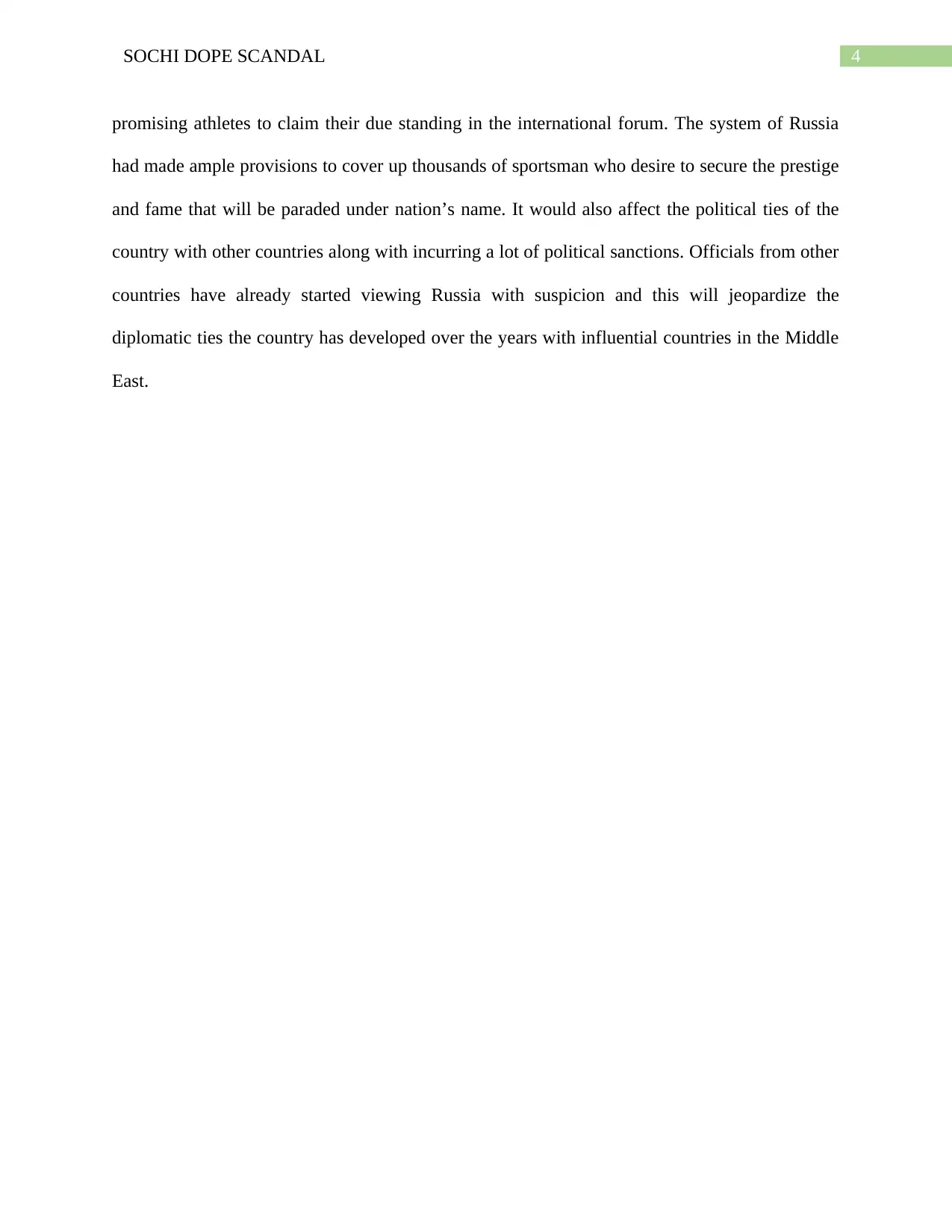
4SOCHI DOPE SCANDAL
promising athletes to claim their due standing in the international forum. The system of Russia
had made ample provisions to cover up thousands of sportsman who desire to secure the prestige
and fame that will be paraded under nation’s name. It would also affect the political ties of the
country with other countries along with incurring a lot of political sanctions. Officials from other
countries have already started viewing Russia with suspicion and this will jeopardize the
diplomatic ties the country has developed over the years with influential countries in the Middle
East.
promising athletes to claim their due standing in the international forum. The system of Russia
had made ample provisions to cover up thousands of sportsman who desire to secure the prestige
and fame that will be paraded under nation’s name. It would also affect the political ties of the
country with other countries along with incurring a lot of political sanctions. Officials from other
countries have already started viewing Russia with suspicion and this will jeopardize the
diplomatic ties the country has developed over the years with influential countries in the Middle
East.
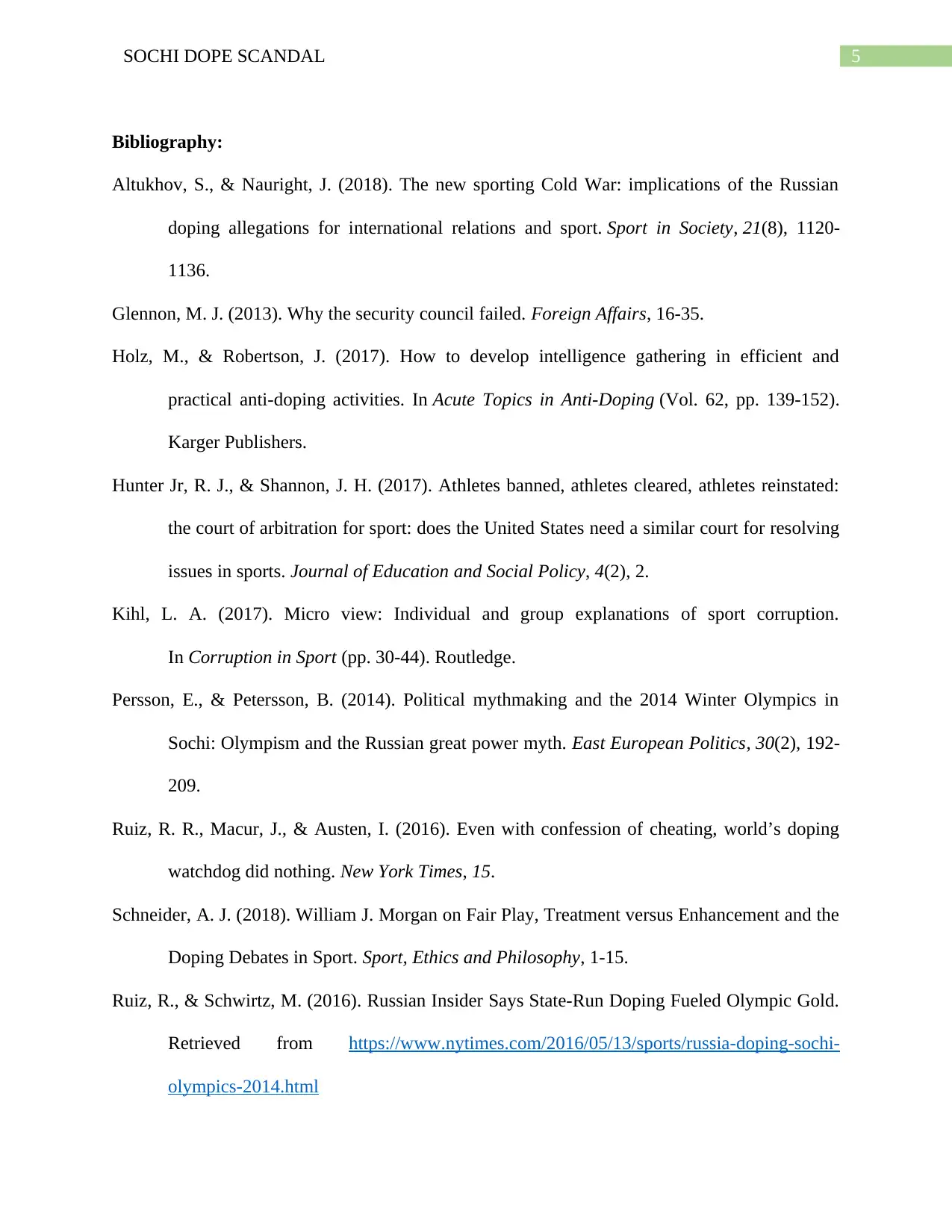
5SOCHI DOPE SCANDAL
Bibliography:
Altukhov, S., & Nauright, J. (2018). The new sporting Cold War: implications of the Russian
doping allegations for international relations and sport. Sport in Society, 21(8), 1120-
1136.
Glennon, M. J. (2013). Why the security council failed. Foreign Affairs, 16-35.
Holz, M., & Robertson, J. (2017). How to develop intelligence gathering in efficient and
practical anti-doping activities. In Acute Topics in Anti-Doping (Vol. 62, pp. 139-152).
Karger Publishers.
Hunter Jr, R. J., & Shannon, J. H. (2017). Athletes banned, athletes cleared, athletes reinstated:
the court of arbitration for sport: does the United States need a similar court for resolving
issues in sports. Journal of Education and Social Policy, 4(2), 2.
Kihl, L. A. (2017). Micro view: Individual and group explanations of sport corruption.
In Corruption in Sport (pp. 30-44). Routledge.
Persson, E., & Petersson, B. (2014). Political mythmaking and the 2014 Winter Olympics in
Sochi: Olympism and the Russian great power myth. East European Politics, 30(2), 192-
209.
Ruiz, R. R., Macur, J., & Austen, I. (2016). Even with confession of cheating, world’s doping
watchdog did nothing. New York Times, 15.
Schneider, A. J. (2018). William J. Morgan on Fair Play, Treatment versus Enhancement and the
Doping Debates in Sport. Sport, Ethics and Philosophy, 1-15.
Ruiz, R., & Schwirtz, M. (2016). Russian Insider Says State-Run Doping Fueled Olympic Gold.
Retrieved from https://www.nytimes.com/2016/05/13/sports/russia-doping-sochi-
olympics-2014.html
Bibliography:
Altukhov, S., & Nauright, J. (2018). The new sporting Cold War: implications of the Russian
doping allegations for international relations and sport. Sport in Society, 21(8), 1120-
1136.
Glennon, M. J. (2013). Why the security council failed. Foreign Affairs, 16-35.
Holz, M., & Robertson, J. (2017). How to develop intelligence gathering in efficient and
practical anti-doping activities. In Acute Topics in Anti-Doping (Vol. 62, pp. 139-152).
Karger Publishers.
Hunter Jr, R. J., & Shannon, J. H. (2017). Athletes banned, athletes cleared, athletes reinstated:
the court of arbitration for sport: does the United States need a similar court for resolving
issues in sports. Journal of Education and Social Policy, 4(2), 2.
Kihl, L. A. (2017). Micro view: Individual and group explanations of sport corruption.
In Corruption in Sport (pp. 30-44). Routledge.
Persson, E., & Petersson, B. (2014). Political mythmaking and the 2014 Winter Olympics in
Sochi: Olympism and the Russian great power myth. East European Politics, 30(2), 192-
209.
Ruiz, R. R., Macur, J., & Austen, I. (2016). Even with confession of cheating, world’s doping
watchdog did nothing. New York Times, 15.
Schneider, A. J. (2018). William J. Morgan on Fair Play, Treatment versus Enhancement and the
Doping Debates in Sport. Sport, Ethics and Philosophy, 1-15.
Ruiz, R., & Schwirtz, M. (2016). Russian Insider Says State-Run Doping Fueled Olympic Gold.
Retrieved from https://www.nytimes.com/2016/05/13/sports/russia-doping-sochi-
olympics-2014.html
⊘ This is a preview!⊘
Do you want full access?
Subscribe today to unlock all pages.

Trusted by 1+ million students worldwide
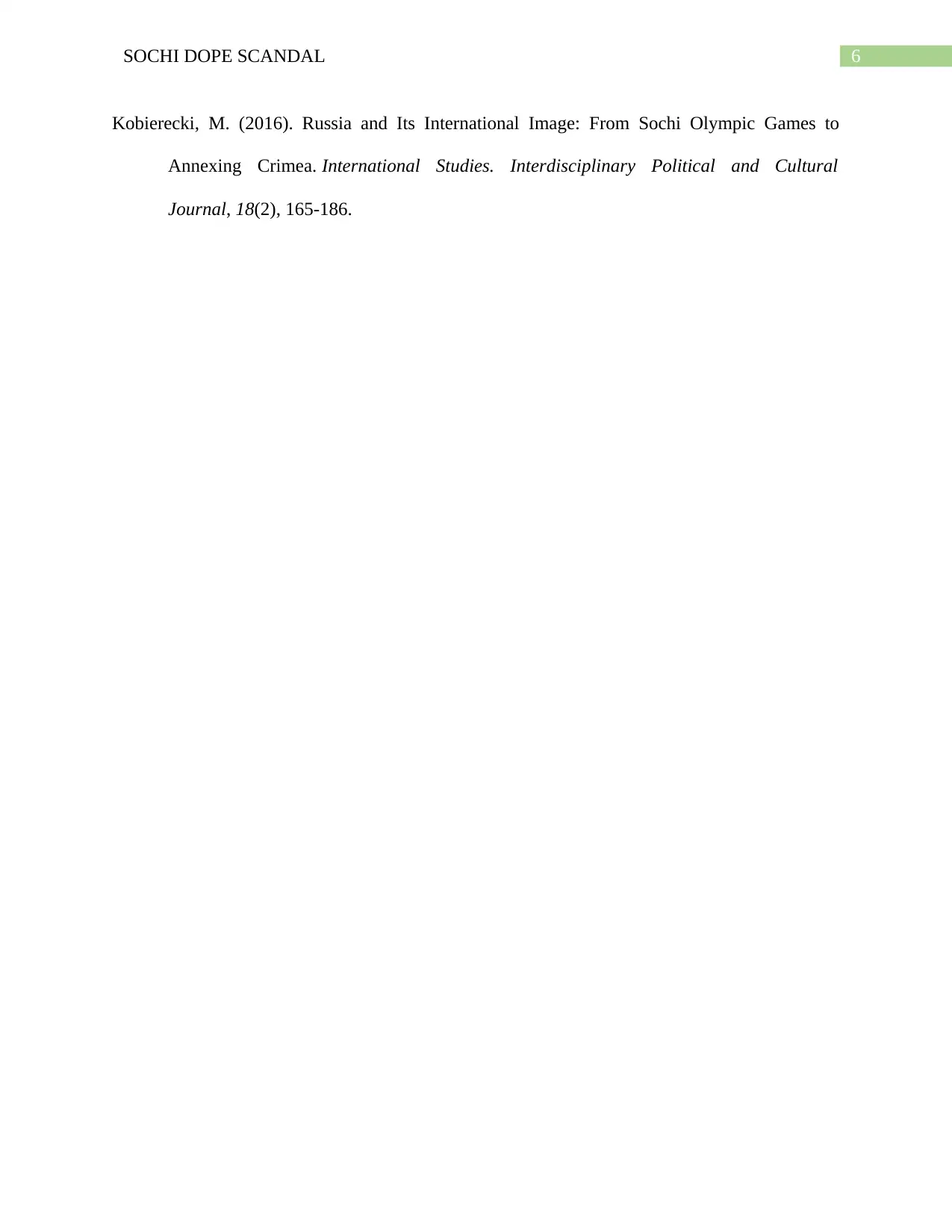
6SOCHI DOPE SCANDAL
Kobierecki, M. (2016). Russia and Its International Image: From Sochi Olympic Games to
Annexing Crimea. International Studies. Interdisciplinary Political and Cultural
Journal, 18(2), 165-186.
Kobierecki, M. (2016). Russia and Its International Image: From Sochi Olympic Games to
Annexing Crimea. International Studies. Interdisciplinary Political and Cultural
Journal, 18(2), 165-186.
1 out of 7
Related Documents
Your All-in-One AI-Powered Toolkit for Academic Success.
+13062052269
info@desklib.com
Available 24*7 on WhatsApp / Email
![[object Object]](/_next/static/media/star-bottom.7253800d.svg)
Unlock your academic potential
Copyright © 2020–2025 A2Z Services. All Rights Reserved. Developed and managed by ZUCOL.





